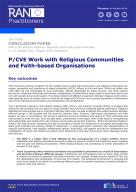Details
- Publication date
- 15 February 2022
- Author
- Directorate-General for Migration and Home Affairs
- RAN Publications Topic
- Cults
Description
There has been growing recognition of the multiple ways in which faith-based actors and religious communities can support prevention and countering of violent extremism (P/CVE) efforts on the local level. While such efforts are most often led and coordinated by local authorities, officials responsible for public security, and social support services for vulnerable individuals and families, collaboration is needed with a wider range of community actors who can reach people and provide support.
Promoting resilient and effective cooperation between religious communities, state agencies and civil society actors is crucial for all stages of P/CVE work, from primary prevention to intervention with at-risk individuals/communities and rehabilitation and reintegration. This is particularly relevant in the Western Balkans (WB) where a vast majority of people identify as religious and where the role of religion has an impact on social cohesion and community resilience against polarisation.
Religious identities and communities are an important reference point when we seek to identify and explain divisions between different groups in WB societies and the dynamics between them. Similarly, faith-based organisations and faith leaders can play a reconciliatory role and be a significant source of resilience and healing for both individuals and communities in times of crisis. Over the past years, practitioners in the region have voiced need for strengthening safe partnerships and collaboration with religious communities across faith traditions.
“RAN in the Western Balkans” made a first step towards addressing this gap by providing a format for practitioners to exchange knowledge and share good practices and existing models of cooperation. A small-scale expert workshop with representatives of religious communities, inter-religious collaboration centres, local NGOs, and support services for reintegration and rehabilitation of women and children was held in North Macedonia to kick-start this process.
Main takeaways include the following:
- The WBs is a region that is still affected by the consequences of a recent conflict: Political instabilities and ongoing polarisation are partly a legacy of previous conflicts and insufficient ways of dealing with the past and seeking reconciliation. These structural factors are contributing to further polarisation of societies in the region.
- There is growing ethno-national extremism and cumulative extremism as a result of polarisation and dynamics between different groups. Practitioners and policymakers have for many years worked to address the threat of religiously motivated extremism (for example, foreign terrorist fighters (FTFs) and the rehabilitation and reintegration of returnees from Daesh). The landscape of extremism is changing and more focus needs to be placed on monitoring different types of extremist narratives promoting interethnic tensions, hate and violence.
- Existing P/CVE models need to be tailored to local needs and administered by local actors: Special local knowledge and ethno-national sensitivity is needed in order to administer P/CVE in the polarised societies of the WB. EU models of P/CVE need to be adjusted to account for local contexts.
- There is a need for both mechanisms of cooperation and a will to cooperate: While there are some existing models of cooperation between the state, local government and religious communities in addressing P/CVE challenges, there is a need for further exchanges and trust-building between these actors.
This paper presents the main highlights of the discussion held in Skopje and relevant recommendations to different target groups.
The document is also available in: Albanian | Macedonian | Serbian.

